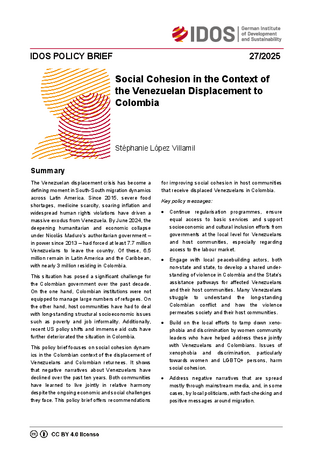Social cohesion in the context of the Venezuelan displacement to Colombia
López Villamil, StéphaniePolicy Brief (27/2025)
Bonn: German Institute of Development and Sustainability (IDOS)
DOI: https://doi.org/10.23661/ipb27.2025
Span. Ausg. u.d.T.:
Cohesión social en el contexto del desplazamiento Venezolano hacia Colombia
(IDOS Policy Brief 28/2025)
The Venezuelan displacement crisis has become a defining moment in South-South migration dynamics across Latin America. Since 2015, severe food shortages, medicine scarcity, soaring inflation and widespread human rights violations have driven a massive exodus from Venezuela. By June 2024, the deepening humanitarian and economic collapse under Nicolás Maduro’s authoritarian government – in power since 2013 – had forced at least 7.7 million Venezuelans to leave the country. Of these, 6.5 million remain in Latin America and the Caribbean, with nearly 3 million residing in Colombia.
This situation has posed a significant challenge for the Colombian government over the past decade. On the one hand, Colombian institutions were not equipped to manage large numbers of refugees. On the other hand, host communities have had to deal with long-standing structural socioeconomic issues such as poverty and job informality. Additionally, recent US policy shifts and immense aid cuts have further deteriorated the situation in Colombia.
This policy brief focuses on social cohesion dynamics in the Colombian context of the displacement of Venezuelans and Colombian returnees. It shows that negative narratives about Venezuelans have declined over the past ten years. Both communities have learned to live jointly in relative harmony despite the ongoing economic and social challenges they face. This policy brief offers recommendations
for improving social cohesion in host communities that receive displaced Venezuelans in Colombia.
Key policy messages:
• Continue regularisation programmes, ensure equal access to basic services and support socioeconomic and cultural inclusion efforts from governments at the local level for Venezuelans and host communities, especially regarding access to the labour market.
• Engage with local peacebuilding actors, both non-state and state, to develop a shared understanding of violence in Colombia and the State’s assistance pathways for affected Venezuelans and their host communities. Many Venezuelans struggle to understand the long-standing Colombian conflict and how the violence permeates society and their host communities.
• Build on the local efforts to tamp down xenophobia and discrimination by women community leaders who have helped address these jointly with Venezuelans and Colombians. Issues of xenophobia and discrimination, particularly towards women and LGBTQ+ persons, harm social cohesion.
• Address negative narratives that are spread mostly through mainstream media, and, in some cases, by local politicians, with fact-checking and positive messages around migration.
Stéphanie López Villamil is an IDOS research partner and independent researcher.

